
Genus is a taxonomic rank above species and below family as used in the biological classification of living and fossil organisms as well as viruses. In binomial nomenclature, the genus name forms the first part of the binomial species name for each species within the genus.

Herring are various species of forage fish, mostly belonging to the family of Clupeidae.

Jasmine is a genus of shrubs and vines in the olive family of Oleaceae. It contains around 200 species native to tropical and warm temperate regions of Eurasia, Africa, and Oceania. Jasmines are widely cultivated for the characteristic fragrance of their flowers. Additionally a number of unrelated species of plants or flowers contain the word "jasmine" in their common names.

The Agricultural Research Service (ARS) is the principal in-house research agency of the United States Department of Agriculture (USDA). ARS is one of four agencies in USDA's Research, Education and Economics mission area. ARS is charged with extending the nation's scientific knowledge and solving agricultural problems through its four national program areas: nutrition, food safety and quality; animal production and protection; natural resources and sustainable agricultural systems; and crop production and protection. ARS research focuses on solving problems affecting Americans every day. The ARS Headquarters is located in the Jamie L. Whitten Building on Independence Avenue in Washington, D.C., and the headquarters staff is located at the George Washington Carver Center (GWCC) in Beltsville, Maryland. For 2018, its budget was $1.2 billion.

The Integrated Taxonomic Information System (ITIS) is an American partnership of federal agencies designed to provide consistent and reliable information on the taxonomy of biological species. ITIS was originally formed in 1996 as an interagency group within the US federal government, involving several US federal agencies, and has now become an international body, with Canadian and Mexican government agencies participating. The database draws from a large community of taxonomic experts. Primary content staff are housed at the Smithsonian National Museum of Natural History and IT services are provided by a US Geological Survey facility in Denver. The primary focus of ITIS is North American species, but many biological groups exist worldwide and ITIS collaborates with other agencies to increase its global coverage.
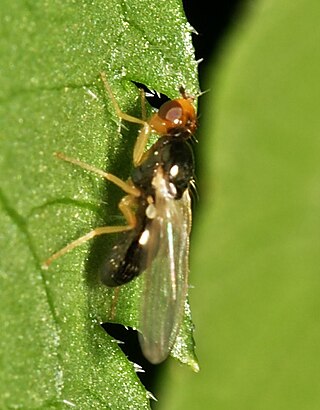
The Psilidae are family of flies. Commonly called the rust flies, at least 38 species are in four genera. The carrot fly is a member of this group. They are found mainly in the Holarctic.
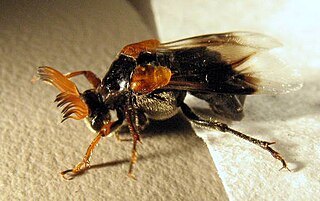
Ripiphoridae is a cosmopolitan family of some 450 described species of beetles sometimes called "wedge-shaped beetles". Ripiphoridae are unusual among beetle families in that many species are hypermetamorphic parasitoids, an attribute that they share with the Meloidae. Members of the family differ in their choice of hosts, but most attack various species of bees or wasps, while some others attack cockroaches or beetles. Many species of Ripiphoridae have abbreviated elytra, and flabellate or pectinate antennae.
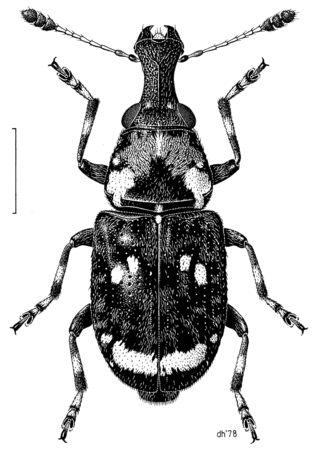
Anthribidae is a family of beetles also known as fungus weevils. The antennae are not elbowed, may occasionally be longer than the body and thread-like, and can be the longest of any members of Curculionoidea. As in the Nemonychidae, the labrum appears as a separate segment to the clypeus, and the maxillary palps are long and projecting.
The World Register of Marine Species (WoRMS) is a taxonomic database that aims to provide an authoritative and comprehensive list of names of marine organisms.

Oberea is a genus of longhorn beetles, most of which are stem borers of various plants, including blackberries and their relatives.

Clivina is a genus of ground beetle native to the Palearctic, the Nearctic, the Near East and North Africa. There are more than 600 described species in Clivina.

Hydrochus is the only living genus of beetle in the family Hydrochidae, which belongs to the superfamily Hydrophiloidea, and was formerly treated as a subfamily of Hydrophilidae. Hydrochus includes about 180 species, which are found worldwide. The name "Hydrochus" has also been used for a fly genus in the family Dolichopodidae, but this is a junior subjective synonym of the genus Rhaphium.
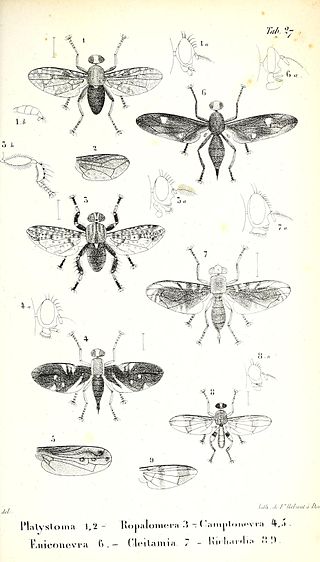
The Ropalomeridae are a family of acalyptrate flies.

iNaturalist is an American 501(c)(3) nonprofit social network of naturalists, citizen scientists, and biologists built on the concept of mapping and sharing observations of biodiversity across the globe. iNaturalist may be accessed via its website or from its mobile applications. iNaturalist includes an automated species identification tool, and users further assist each other in identifying organisms from photographs and even sound recordings. As of 9 July 2024, iNaturalist users had contributed approximately 197,660,888 observations of plants, animals, fungi, and other organisms worldwide, and 290,007 users were active in the previous 30 days.
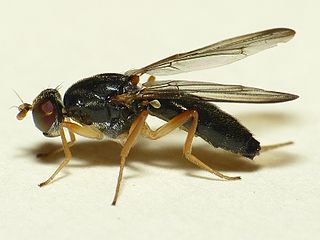
Chyliza is a genus of rust flies.
Commedia erudita are Italian comedies written for the enjoyment of scholars in the sixteenth century. They were meant to mimic and emulate the works of Terence and Plautus.

Chyliza leptogaster is a species of rust flies.
Plants of the World Online (POWO) is an online database published by the Royal Botanic Gardens, Kew. It was launched in March 2017 with the ultimate aim being "to enable users to access information on all the world's known seed-bearing plants by 2020". This was Kew's answer to the "2020 target 1" of the Convention on Biological Diversity (CBD): "an online flora for all known plants."
















